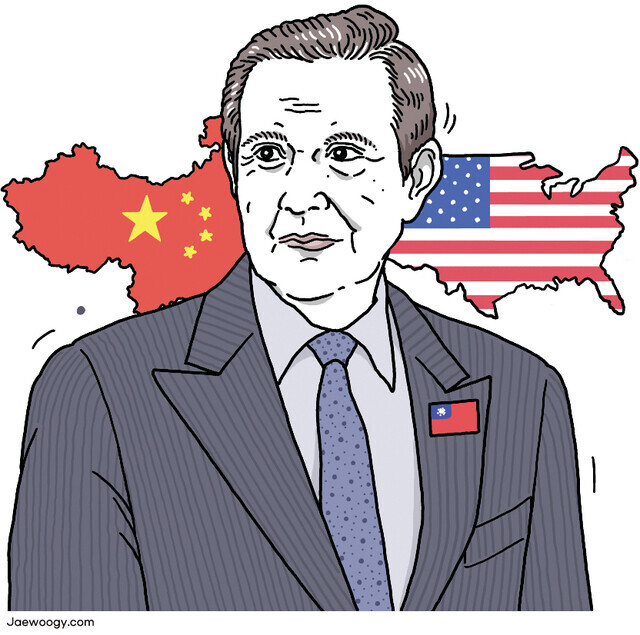hankyoreh
Links to other country sites 다른 나라 사이트 링크
[Column] Ma Ying-jeou’s welcome yet fraught visit to China

Ma Ying-jeou, former president of Taiwan, stepped foot on the Chinese mainland on Monday. That was the first time a former or current Taiwanese president has visited China in 74 years, since the Nationalists, known as the Kuomintang, fled to Taiwan after losing to the Communists in the Chinese Civil War in 1949.
Ma described his trip to China as a personal visit during which he will pay respects at his ancestor’s graves in Xiangtan County, Hunan Province, for the Qingming Festival, during which Chinese clean the tombs of their forebears, and visit Shanghai, as well as Nanjing and Chongqing, former capitals of the Kuomintang government.
Despite his denials, Ma’s visit is actually a political gambit based on a subtle assessment of the situation. Taiwan’s presidential election is coming up next January amid growing fears that China will seek to regain control over the self-governing island by force. Furthermore, Taiwanese President Tsai Ing-wen is planning to meet Kevin McCarthy, speaker of the US House of Representatives, during an upcoming visit to the US.
By visiting Taiwan at such a juncture, Ma encourages the Taiwanese to ask whether they can trust the US to keep the peace as a way of expanding his political influence and that of his party, which is still called the Kuomintang (KMT).
As a leading politician in the KMT’s pro-Chinese faction, Ma served two terms as Taiwan’s president, from 2008 to 2016, which he describes as a golden age in cross-strait relations. That was the peak of Taiwan’s economic relations with China, and Ma also pulled off the first “cross-strait summit” with Chinese President Xi Jinping in Singapore in November 2015.
But anti-Chinese sentiment has rapidly expanded in Taiwan since the student-led Sunflower Movement, which was launched after the rushed enactment of the Cross-Strait Service Trade Agreement with China in 2014.
China’s crackdown in Hong Kong and its continuing application of military pressure through jet fighters and warships would seem to have left little room for a pro-Chinese KMT in Taiwanese politics.
But after Russia invaded Ukraine last year and China held exercises aimed at blockading Taiwan following a visit by then-serving US House Speaker Nancy Pelosi, a subtle shift occurred in Taiwanese public opinion.
A recent public opinion poll in Taiwan found that around 40% of respondents thought the US would only provide weapons, as it has to Ukraine, if China were to invade Taiwan, while just 10% of respondents thought the US would send troops to aid the island’s defense.
According to Wang Hsin-hsien, director of the Graduate Institute of East Asian Studies at National Cheng Chi University, whether the US is a dependable or a doubtful partner will be a key question in Taiwan’s next presidential election.
What about China’s response? The visit was arranged by Wang Huning, chair of the Chinese People’s Political Consultative Conference. Wang is in charge of drafting a new strategy for reunification with Taiwan in Xi Jinping’s third term in office.
Since the “one country, two systems” principle has lost credibility following China’s repression in Hong Kong, China is seeking a new way to persuade the Taiwanese to agree to unification with China.
Ma Ying-jeou’s visit to the land of his ancestors for the Qingming Festival plays into the Chinese Communist Party’s attempt to underline that the Taiwanese are part of the Chinese people, sharing ancestors and traditions with those on the mainland.
But if Ma appears to be following the dictates of the Chinese Communist Party, there could be public backlash in Taiwan, with critics slamming him for treachery for kowtowing to China even as it threatens Taiwan. China is glad to see Ma, but he remains a fraught guest.
By Park Min-hee, editorial writer
Please direct questions or comments to [english@hani.co.kr]

Editorial・opinion
![[Editorial] Intensifying US-China rivalry means Seoul must address uncertainty with Beijing sooner than later [Editorial] Intensifying US-China rivalry means Seoul must address uncertainty with Beijing sooner than later](https://flexible.img.hani.co.kr/flexible/normal/500/300/imgdb/original/2024/0517/8117159322045222.jpg) [Editorial] Intensifying US-China rivalry means Seoul must address uncertainty with Beijing sooner than later
[Editorial] Intensifying US-China rivalry means Seoul must address uncertainty with Beijing sooner than later![[Column] When ‘fairness’ means hate and violence [Column] When ‘fairness’ means hate and violence](https://flexible.img.hani.co.kr/flexible/normal/500/300/imgdb/original/2024/0516/7417158465908824.jpg) [Column] When ‘fairness’ means hate and violence
[Column] When ‘fairness’ means hate and violence- [Editorial] Yoon must stop abusing authority to shield himself from investigation
- [Column] US troop withdrawal from Korea could be the Acheson Line all over
- [Column] How to win back readers who’ve turned to YouTube for news
- [Column] Welcome to the president’s pity party
- [Editorial] Korea must respond firmly to Japan’s attempt to usurp Line
- [Editorial] Transfers of prosecutors investigating Korea’s first lady send chilling message
- [Column] Will Seoul’s ties with Moscow really recover on their own?
- [Column] Samsung’s ‘lost decade’ and Lee Jae-yong’s mismatched chopsticks
Most viewed articles
- 1For new generation of Chinese artists, discontent is disobedience
- 2[Editorial] Transfers of prosecutors investigating Korea’s first lady send chilling message
- 3S. Korea “monitoring developments” after report of secret Chinese police station in Seoul
- 4Xi, Putin ‘oppose acts of military intimidation’ against N. Korea by US in joint statement
- 5[Exclusive] Unearthed memo suggests Gwangju Uprising missing may have been cremated
- 6N. Korean media upgrades epithet for leader’s daughter from “beloved” to “respected”
- 7Yoon says concern about biased diplomacy is being incited by “communist totalitarian forces”
- 8[Column] US troop withdrawal from Korea could be the Acheson Line all over
- 9[Editorial] Intensifying US-China rivalry means Seoul must address uncertainty with Beijing sooner t
- 10[Interview] Recalling seeing soldiers secretly burying bodies behind Gwangju Prison